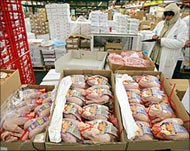Bird flu: Egypt on alert, but not ready
Egypt, the Arab world’s most populous country, has gone on high alert after a warning from the UN that the deadly H5N1 bird flu strain could hit North Africa and the Middle East.

Officials from the United Nations’ Food and Agriculture Organisation (FAO) said they were worried about the potential spread of avian influenza along the pathways of migratory birds to northern and eastern Africa.
On Saturday, Egyptian President Hosni Mubarak held a ministerial meeting to discuss measures in the event bird flu cases are detected.
A national committee comprising various government bodies which has been set up to monitor the avian flu situation held an emergency meeting on Friday attended by representatives from the ministries of defence, agriculture and health, in addition to the World Health Organisation (WHO), according to the official Middle East News Agency.
The Egyptian authorities had already banned poultry imports and bird hunting more than two weeks ago.
On 17 October, WHO issued a bulletin warning that daily dynamic interaction with other countries could easily result in the introduction of avian influenza into the Eastern Mediterranean region (EMR).
The bulletin listed the return of expatriate workers, trade, and tourism, in addition to migratory birds, as likely risk factors.
“The EMR is the nearest region to the current focus of unprecedented outbreaks of avian influenza than any other WHO region outside of Asia,” the bulletin added.
Not prepared
With the discovery of the virus in Turkey and Romania, Egyptian officials have been working to assure the public that the country has been safe so far and all safety measures have been taken.
But the measures appear limited to precautionary actions and no national pandemic preparedness plan has been announced.
Ahmad Tawfiq, head of the government-run Authority of Veterinary Services (AVS), said his organisation had increased the monitoring of Egypt’s border areas, especially in North Sinai’s coastal area and Fayum, 100km south of Cairo.
Both areas are frequented by migratory birds.
 |
|
The ban on imported poultry is |
The authorities have also tightened airport quarantine controls.
Environmental Affairs Minister Maged George said his ministry had taken more than 500 blood samples from migratory birds flying across Egypt to make sure they were not carrying the disease. None had tested positive.
The AVS banned the import of poultry products, including eggs and feathers, from flu-infected countries. A bulletin was sent to veterinary units across the country on how and when to report poultry deaths.
Markets affected
The quail market has been severely affected as customers snubbed the bird, an autumn delicacy, which migrates to Egypt at this time of the year.
Meanwhile, the ban on imported poultry and its by-products is expected to raise the price of already expensive white meat products.
Before flying to Canada in an avian flu-related mission, Health Minster Awad Tag al-Din said Egypt was different from other countries which reported cases of the disease because there had been no infections so far.
“The flu is being monitored closely and is under control,” he said.
Public scepticism
But some suspect the authorities will not announce avian flu cases if any are detected.
This fear stems from a much criticised state policy that maintains “everything is under control” in situations such as this. Such stances are often met with scepticism by Egyptians.
Fahmy Howeidy, a respected Egyptian columnist, launched an attack on the government’s policy in a recent article published in the London-based Al-Sharq Al-Awsat newspaper.
He demanded that officials should adopt a transparent and honest stand with avian flu developments.
|
“The real fear is if the avian influenza becomes pandemic. If that happens in a developing country like Egypt, it will be a catastrophe” Rauf Hamid, National Institute for Pharmaceutical Research |
Rauf Hamid, a professor of pharmaceutical sciences and toxicology in the National Institute for Pharmaceutical Research, told Aljazeera.net: “The real fear is if the avian influenza becomes pandemic. If that happens in a developing country like Egypt, it will be a catastrophe.
“I think the minister of health flew to Canada to do his avian flu homework. I doubt they have a preparedness plan,” he said.
Although Egypt has a reputable national vaccine institute, Vaccera, its efficiency in handling avian flu has yet to be tested.
When rating developing countries, Egypt’s Vaccera comes third after Cuba and Iran, Hamid said.
“But in recent years, it has been responding to market demands and focused on profit rather than specialising and expanding in vaccines and antivirals.
“So this is a problem in Egypt as we face the avian flu threat.”
Officials at Vaccera and the Ministry of Health were not available for comment.
Tamiflu unavailable
There is no vaccine for avian flu, but there are anti-influenza drugs such as Tamiflu made by Swiss pharmaceutical company Roche, which does not cure the flu but can lessen symptoms if taken shortly after they appear.
 |
|
Tamiflu cannot be found even in |
It is one of a class of treatments recommended by WHO for use in the event of a flu pandemic.
Although it is authorised by the Ministry of Health, Tamiflu cannot be found in Cairo pharmacies.
“Don’t try to look for it anywhere, it’s not in Egypt,” a pharmacist in the top El-Ezabi chemists told Aljazeera.net.
“Antivirals are very expensive and manufactured abroad,” said Hamid. “In the case of a pandemic, the developed countries and rich people will find treatment. But what will a country like Egypt do?”
Counting on luck?
Usama Raslan, head of Ain Shams University’s Medical Microbiology and Infection Control Department, however, argues that the issue is not limited to Egypt’s preparedness.
|
“On the other hand we might be lucky … Egypt is a warm country and migratory birds do not stop here for long” Usama Raslan, head of Ain Shams University’s Medical Microbiology and Infection Control Department |
“If there is no international cooperation in infection control measures between the UN, WHO and governments, there will be a problem everywhere,” he told Aljazeera.net.
“I don’t think the situation is as grave as it appears to be and I don’t think any government, here or elsewhere, will stop short of taking the needed precautionary methods.
“On the other hand we might be lucky,” said Raslan. “Egypt is a warm country and migratory birds do not stop here for long.”